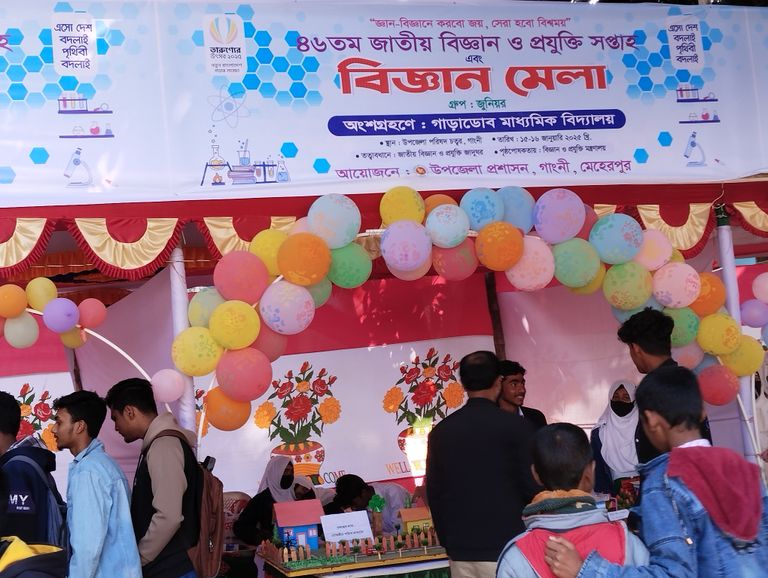
Organizing a Science Fair A Comprehensive Guide.
A science fair is an excellent platform for students to showcase their creativity, scientific knowledge, and problem-solving skills. It not only encourages young minds to explore the wonders of science but also fosters teamwork, critical thinking, and innovation. Organizing a science fair requires careful planning, coordination, and execution. This guide will take you through the essential steps to successfully host a science fair at your school or community.
- Planning the Science Fair
1.1 Setting Goals and Objectives
Before you begin, define the purpose of the science fair. Ask yourself:
Is it to promote scientific research among students?
Do you want to encourage innovation and problem-solving?
Should the event focus on environmental, technological, or general science themes?
Clear objectives will help in making informed decisions throughout the organizing process.
1.2 Forming an Organizing Committee
A dedicated team is essential for the smooth execution of the event. The committee should include:
Teachers and Mentors – To guide students and oversee the projects.
Student Volunteers – To help with logistics and coordination.
Judges – Experts from the fields of science, technology, and education.
Sponsors and Donors – To fund the event if needed.
1.3 Deciding the Theme and Categories
A theme-based science fair makes the event more focused and exciting. Some popular themes include:
Environmental Sustainability
Robotics and Artificial Intelligence
Space Exploration
Health and Medicine
Renewable Energy
You can also create different project categories like experiments, engineering models, research papers, and innovative ideas.
1.4 Selecting the Date and Venue
Choose a date that allows enough preparation time for participants. The venue should be spacious enough to accommodate displays, presentations, and attendees. Schools, community halls, and open grounds are excellent choices.
- Organizing Student Participation
2.1 Invitations and Registrations
Spread the word about the science fair through:
Posters and banners in schools and community centers
Social media and emails
Announcements in classrooms and assemblies
Set up an online or offline registration system where students can submit project ideas and participant details.
2.2 Providing Guidelines and Resources
Ensure students understand:
Project submission deadlines
Rules and regulations (size of models, use of chemicals, safety measures)
Judging criteria (creativity, scientific approach, presentation skills)
Encourage them to use sustainable materials and follow ethical research practices.
2.3 Assigning Mentors and Workshops
Mentors play a crucial role in guiding students through research and experimentation. Conduct workshops on:
Scientific methodology
Presentation skills
Data analysis and documentation
Workshops can be conducted by teachers, scientists, or professionals from universities and research institutes.
- Execution and Management
3.1 Setting Up the Fair
Arrange tables and display boards for each participant.
Ensure proper lighting and ventilation.
Set up a help desk for inquiries and assistance.
Provide safety measures, especially for experiments involving chemicals or electrical circuits.
3.2 Conducting the Event
Start with an inauguration ceremony featuring a keynote speech from a scientist or educator.
Allow students to present their projects and interact with visitors.
Organize live demonstrations and interactive science activities for engagement.
Arrange food and refreshment stalls for attendees.
3.3 Judging and Evaluation
Judging should be fair and transparent. Criteria may include:
Originality and creativity
Scientific accuracy
Problem-solving potential
Presentation skills
Announce the winners and provide certificates, trophies, and scholarships if possible.
- Post-Fair Activities
4.1 Awards and Recognitions
Recognize outstanding projects through awards like:
Best Innovation
Best Research
Most Sustainable Project
Audience Favorite
Publish the results on social media and school websites.
4.2 Feedback and Reflection
Gather feedback from participants, visitors, and judges to improve future fairs.
4.3 Encouraging Further Research
Encourage winners to present their projects in national and international competitions. Support students in publishing their research papers or applying for patents.
- Conclusion
A science fair is more than just an exhibition; it is a celebration of curiosity, knowledge, and innovation. With careful planning and execution, it can inspire the next generation of scientists, engineers, and inventors. Whether you are a teacher, student, or community leader, hosting a science fair can be a rewarding experience that promotes education and creativity.

Science Fair: A Gateway to Innovation and Discovery
Science fairs have long been a platform for young minds to explore, innovate, and showcase their scientific talents. These events provide students with an opportunity to apply theoretical knowledge to real-world problems, fostering creativity, critical thinking, and a love for science. Whether in schools, colleges, or national-level competitions, science fairs play a vital role in inspiring future scientists, engineers, and researchers.
The Importance of Science Fairs
Science fairs are more than just exhibitions; they are a celebration of curiosity and exploration. Here are some key reasons why science fairs are important:
- Encouraging Scientific Thinking
Science fairs inspire students to think like scientists. They learn to observe problems, ask questions, form hypotheses, conduct experiments, and analyze results. This process strengthens their analytical and problem-solving skills.
- Hands-On Learning
Unlike traditional classroom learning, science fairs emphasize practical experience. Students conduct experiments, build models, and use technology to demonstrate scientific concepts. This hands-on approach helps them understand complex topics in a better way.
- Developing Creativity and Innovation
Science fairs encourage students to think outside the box. They come up with innovative solutions to real-world problems, from renewable energy sources to environmental conservation and medical advancements.
- Building Confidence and Communication Skills
Presenting a science project to judges, teachers, and visitors helps students develop confidence and improve their communication skills. They learn to explain their ideas clearly and answer questions effectively.
- Teamwork and Collaboration
Many science projects require teamwork. Students collaborate with peers, mentors, and teachers, learning valuable skills in cooperation and project management.
- Exposure to STEM Careers
Participating in science fairs introduces students to various fields in Science, Technology, Engineering, and Mathematics (STEM). It sparks interest in pursuing careers in these domains and motivates them to contribute to scientific advancements.
How to Organize a Successful Science Fair
Organizing a science fair requires planning and coordination. Here’s a step-by-step guide:
- Planning the Event
Set Objectives: Define the goals of the science fair, such as promoting STEM education or addressing global challenges.
Choose a Theme: Having a theme like “Sustainable Solutions” or “Technology for the Future” can make the event more focused and engaging.
Form a Committee: Assign roles for organizing, judging, and managing logistics.
- Inviting Participants
Encourage students from different age groups to participate.
Provide guidelines on project selection, format, and presentation.
Offer mentorship programs to help students refine their ideas.
- Judging and Evaluation
Appoint experienced judges from scientific backgrounds.
Use clear evaluation criteria such as originality, scientific method, presentation, and real-world applicability.
- Engaging the Audience
Arrange interactive sessions, workshops, and guest lectures by scientists and professionals.
Encourage visitors to participate in hands-on experiments.
- Awards and Recognition
Offer prizes to outstanding projects in various categories, such as innovation, sustainability, and best presentation.
Recognize all participants to encourage future involvement.
Popular Science Fair Project Ideas
Here are some exciting project ideas for students:
- Environmental Science Projects
Designing a water purification system using natural materials.
Investigating the effects of plastic pollution on marine life.
Developing biodegradable packaging materials.
- Energy and Sustainability Projects
Creating a solar-powered mobile charger.
Building a wind turbine from recycled materials.
Testing the efficiency of different types of biofuels.
- Health and Medicine Projects
Studying the impact of diet on human concentration levels.
Creating a natural alternative to chemical-based mosquito repellents.
Investigating the antibacterial properties of herbal extracts.
- Robotics and Engineering Projects
Building a robotic arm controlled by sensors.
Developing a smart irrigation system for agriculture.
Creating a self-balancing bicycle using gyroscopic technology.
- Physics and Chemistry Projects
Exploring the effects of different liquids on metal corrosion.
Building a homemade spectrometer to analyze light waves.
Investigating the chemical reactions that produce natural dyes.
The Future of Science Fairs
With advancements in technology, science fairs are evolving. Virtual science fairs, where students present projects online, are becoming popular. This allows wider participation and access to expert feedback from around the world.
Moreover, the integration of Artificial Intelligence (AI), Machine Learning, and Virtual Reality (VR) into science projects is opening new avenues for innovation. Future science fairs will likely focus on global challenges such as climate change, space exploration, and medical research.
Science fairs are a vital part of science education, providing students with a platform to experiment, discover, and innovate. They help develop essential skills like critical thinking, creativity, and communication. Whether you are a student, teacher, or organizer, participating in a science fair is a rewarding experience that fosters a passion for science and technology.
By encouraging young minds to explore scientific possibilities, we are shaping the innovators and problem-solvers of tomorrow. So, let’s continue to support and celebrate science fairs as a gateway to knowledge and discovery.

Science Fair: A Gateway to Innovation and Discovery
Science fairs have long been a platform for young minds to explore, innovate, and showcase their scientific talents. These events provide students with an opportunity to apply theoretical knowledge to real-world problems, fostering creativity, critical thinking, and a love for science. Whether in schools, colleges, or national-level competitions, science fairs play a vital role in inspiring future scientists, engineers, and researchers.
The Importance of Science Fairs
Science fairs are more than just exhibitions; they are a celebration of curiosity and exploration. Here are some key reasons why science fairs are important:
- Encouraging Scientific Thinking
Science fairs inspire students to think like scientists. They learn to observe problems, ask questions, form hypotheses, conduct experiments, and analyze results. This process strengthens their analytical and problem-solving skills.
- Hands-On Learning
Unlike traditional classroom learning, science fairs emphasize practical experience. Students conduct experiments, build models, and use technology to demonstrate scientific concepts. This hands-on approach helps them understand complex topics in a better way.
- Developing Creativity and Innovation
Science fairs encourage students to think outside the box. They come up with innovative solutions to real-world problems, from renewable energy sources to environmental conservation and medical advancements.
- Building Confidence and Communication Skills
Presenting a science project to judges, teachers, and visitors helps students develop confidence and improve their communication skills. They learn to explain their ideas clearly and answer questions effectively.
- Teamwork and Collaboration
Many science projects require teamwork. Students collaborate with peers, mentors, and teachers, learning valuable skills in cooperation and project management.
- Exposure to STEM Careers
Participating in science fairs introduces students to various fields in Science, Technology, Engineering, and Mathematics (STEM). It sparks interest in pursuing careers in these domains and motivates them to contribute to scientific advancements.
How to Organize a Successful Science Fair
Organizing a science fair requires planning and coordination. Here’s a step-by-step guide:
- Planning the Event
Set Objectives: Define the goals of the science fair, such as promoting STEM education or addressing global challenges.
Choose a Theme: Having a theme like “Sustainable Solutions” or “Technology for the Future” can make the event more focused and engaging.
Form a Committee: Assign roles for organizing, judging, and managing logistics.
- Inviting Participants
Encourage students from different age groups to participate.
Provide guidelines on project selection, format, and presentation.
Offer mentorship programs to help students refine their ideas.
- Judging and Evaluation
Appoint experienced judges from scientific backgrounds.
Use clear evaluation criteria such as originality, scientific method, presentation, and real-world applicability.
- Engaging the Audience
Arrange interactive sessions, workshops, and guest lectures by scientists and professionals.
Encourage visitors to participate in hands-on experiments.
- Awards and Recognition
Offer prizes to outstanding projects in various categories, such as innovation, sustainability, and best presentation.
Recognize all participants to encourage future involvement.
Popular Science Fair Project Ideas
Here are some exciting project ideas for students:
- Environmental Science Projects
Designing a water purification system using natural materials.
Investigating the effects of plastic pollution on marine life.
Developing biodegradable packaging materials.
- Energy and Sustainability Projects
Creating a solar-powered mobile charger.
Building a wind turbine from recycled materials.
Testing the efficiency of different types of biofuels.
- Health and Medicine Projects
Studying the impact of diet on human concentration levels.
Creating a natural alternative to chemical-based mosquito repellents.
Investigating the antibacterial properties of herbal extracts.
- Robotics and Engineering Projects
Building a robotic arm controlled by sensors.
Developing a smart irrigation system for agriculture.
Creating a self-balancing bicycle using gyroscopic technology.
- Physics and Chemistry Projects
Exploring the effects of different liquids on metal corrosion.
Building a homemade spectrometer to analyze light waves.
Investigating the chemical reactions that produce natural dyes.
The Future of Science Fairs
With advancements in technology, science fairs are evolving. Virtual science fairs, where students present projects online, are becoming popular. This allows wider participation and access to expert feedback from around the world.
Moreover, the integration of Artificial Intelligence (AI), Machine Learning, and Virtual Reality (VR) into science projects is opening new avenues for innovation. Future science fairs will likely focus on global challenges such as climate change, space exploration, and medical research.
Science fairs are a vital part of science education, providing students with a platform to experiment, discover, and innovate. They help develop essential skills like critical thinking, creativity, and communication. Whether you are a student, teacher, or organizer, participating in a science fair is a rewarding experience that fosters a passion for science and technology.
By encouraging young minds to explore scientific possibilities, we are shaping the innovators and problem-solvers of tomorrow. So, let’s continue to support and celebrate science fairs as a gateway to knowledge and discovery.

Science Fair: A Gateway to Innovation and Discovery
Science fairs have long been a platform for young minds to explore, innovate, and showcase their scientific talents. These events provide students with an opportunity to apply theoretical knowledge to real-world problems, fostering creativity, critical thinking, and a love for science. Whether in schools, colleges, or national-level competitions, science fairs play a vital role in inspiring future scientists, engineers, and researchers.
The Importance of Science Fairs
Science fairs are more than just exhibitions; they are a celebration of curiosity and exploration. Here are some key reasons why science fairs are important:
- Encouraging Scientific Thinking
Science fairs inspire students to think like scientists. They learn to observe problems, ask questions, form hypotheses, conduct experiments, and analyze results. This process strengthens their analytical and problem-solving skills.
- Hands-On Learning
Unlike traditional classroom learning, science fairs emphasize practical experience. Students conduct experiments, build models, and use technology to demonstrate scientific concepts. This hands-on approach helps them understand complex topics in a better way.
- Developing Creativity and Innovation
Science fairs encourage students to think outside the box. They come up with innovative solutions to real-world problems, from renewable energy sources to environmental conservation and medical advancements.
- Building Confidence and Communication Skills
Presenting a science project to judges, teachers, and visitors helps students develop confidence and improve their communication skills. They learn to explain their ideas clearly and answer questions effectively.
- Teamwork and Collaboration
Many science projects require teamwork. Students collaborate with peers, mentors, and teachers, learning valuable skills in cooperation and project management.
- Exposure to STEM Careers
Participating in science fairs introduces students to various fields in Science, Technology, Engineering, and Mathematics (STEM). It sparks interest in pursuing careers in these domains and motivates them to contribute to scientific advancements.
How to Organize a Successful Science Fair
Organizing a science fair requires planning and coordination. Here’s a step-by-step guide:
- Planning the Event
Set Objectives: Define the goals of the science fair, such as promoting STEM education or addressing global challenges.
Choose a Theme: Having a theme like “Sustainable Solutions” or “Technology for the Future” can make the event more focused and engaging.
Form a Committee: Assign roles for organizing, judging, and managing logistics.
- Inviting Participants
Encourage students from different age groups to participate.
Provide guidelines on project selection, format, and presentation.
Offer mentorship programs to help students refine their ideas.